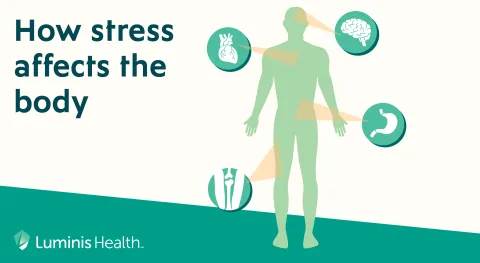by Luminis Health

Our mental health is just as important to care for as our physical health. This is especially true when we’re naturally feeling more stress, fear and anxiety due to the impacts of the coronavirus (COVID-19) pandemic.
These feelings can be overwhelming and cause strong emotions for anyone, both adults and children. The Centers for Disease Control and Prevention reminds us that learning to cope with stress makes you, the people you care about and your community stronger.
Mental health refers to our feelings, emotions, thought patterns and behaviors. We all experience positive and negative feelings—that’s completely normal. The only difference from one person to another is how much it affects our daily functioning and how we cope.
Mental disorders can affect anyone, anywhere
Mental illness affects millions of people each year. A recent Kaiser Family Foundation poll found nearly half of Americans report the COVID-19 outbreak is impacting their mental health.
For the past year, we’ve led a training program on how to recognize the signs and symptoms of a mental health condition. Just as cardiopulmonary resuscitation (CPR) helps you assist someone having a heart attack, you can help someone experiencing a mental illness by understanding how to respond to certain signs.
You can help, too
Having the right tools and knowledge to help can be lifesaving. It’s important if you live with or know of someone who may have a mental illness to know how to have the conversation that encourages them to get the help they need.
Tips from evidence-based training include:
- Pay attention and approach the individual. If you live with someone experiencing a mental illness, no one notices changes more than you. Identify the stressors in their environment. Did anything change environmentally to cause their behavior change? Did they change jobs? Are they having problems with their relationships? Don’t be afraid to approach the person and ask about anything you’re noticing.
- Validate and honor their experience. Let the person know they’re not alone or that they should not be ashamed of their feelings. “You’ll be fine” doesn’t validate how someone feels. Be respectful of the person and how they feel about their experience.
- Get informed. There are endless resources available to help someone who’s experiencing a mental illness. The National Institute of Mental Health, Mental Health First Aid and NAMI are just a few of the many organizations that provide free tools for those looking to learn more about mental health or seek to train themselves.
- Encourage them to seek help. Any time there’s a concern, you should talk with them. Someone may tell you they’re fine or that they don’t need help, but that doesn’t mean they’re okay. If the person’s behavior changes and is causing distress, encourage them to seek help.
Early intervention can prevent symptoms from going from mild to severe. If it’s causing distress to the person, it’s time to seek help. If behavior or thinking starts to get dangerous—toward you or someone else—it’s a must to get help. Get them to their nearest emergency room. Call 911, if needed. Emergency rooms are safe and have protocols in place to prevent the spread of COVID-19.
Know that we’ve expanded services to better support people who are in a psychiatric crisis. The J. Kent McNew Family Medical Center provides both inpatient and outpatient options for care. The medical center provides a brand new state-of-the-art inpatient psychiatric hospital, as well as our relocated psychiatric day hospital. Both have procedures in place to protect our patients from COVID-19.
Living with someone who has a mental illness can be challenging, especially now. You can help us share the message that no one should be ashamed to admit they have a mental illness. If you’re well informed and equipped to intervene earlier on, not only are you helping to reduce stigma around mental illness, you’re addressing one of the most important public health issues of our time.
 Donna Phillips, M.A., is the clinical director at the J. Kent Mcnew Medical Center’s Psychiatric Day Hospital. You can reach her at 667-204-7311.
Donna Phillips, M.A., is the clinical director at the J. Kent Mcnew Medical Center’s Psychiatric Day Hospital. You can reach her at 667-204-7311.
 Maria Winters, LCPC, is a mental health clinician at AAMC. You can reach her at 667-204-7311.
Maria Winters, LCPC, is a mental health clinician at AAMC. You can reach her at 667-204-7311.



